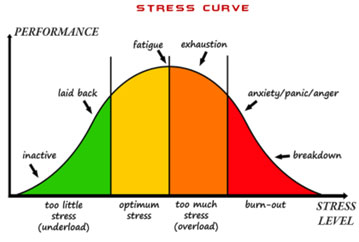Introduction:

We are living in a highly competitive world, where the students have to run, run and run to win the race without even knowing why they are running. It is quite natural to be anxious before the final race. Nevertheless, when it adversely affects your performance, you need to cope with that anxiety in the right way.
We cannot deny the fact that students get pressure from parents, teachers, school and society, especially from 9th grade to 12th grade. The student’s achievement is criticised by society, just because society thinks of it as a measure of success not only for the students but also for the parents and for the competency of the schools in which they study.
Let us see some common symptoms of test anxiety and a few strategies to cope with exam anxiety in this article.
What Is Test Anxiety?
It is a type of performance anxiety wherein the thought of failure is feared so much that it leads to symptoms which stop you from performing your best in an exam situation.
Even adults can have this type of anxiety before an interview or an important presentation.
Symptoms of Test Anxiety
Physical Symptoms:
- Dry mouth
- Headaches
- Nausea, vomiting
- Diarrhoea
- Palpitations
- Excessive sweating
- Rapid shallow breathing
- Fainting attack at times
Emotional Symptoms:
- Low self-confidence
- Feelings of helplessness, hopelessness
- Excessive fear
- Crying spells
Behavioural Symptoms:
- Restless and fidgety
- Avoidance (e.g., skipping class, avoiding tests)
- Anger outbursts
Cognitive Symptoms:
- Not able to focus, going blank
- Impaired concentration
- Unnecessary comparison with others’ preparation
Coping Strategies for Test Anxiety:
We are going to discuss these coping strategies under two headings –
1) Well before and 2) Just before the exams
Coping Strategies Well Before Your Exams:
1. Visualisation of Success
- Visualise your success, and what you want to achieve with your imagination, which helps to stay self-motivated.
- While studying, imagine yourself feeling confident while writing the exam, how others are appreciating you for your success, etc.
- Visualizing yourself performing well in the test can help you make it happen in real life.
2. Positive Self-Talk
- Talking negatively or thinking negatively will worsen test anxiety.
- Replace any negative thoughts with positive ones.
- Consider if there are any better things that you could say to yourself.
For example,
| I should have studied more; my preparation is not enough. | I have prepared well for this test, though I couldn’t complete all the portions. |
| I must do well in the exam or else there is no point in living. | I will try to perform well in the test; even if I don’t do well, this is not end of the world. |
| I am not as talented as others. | Everybody has different strengths, I have confidence. |
3. Sincere and Planned Preparation for the Test:
- The best and most important step to reduce test anxiety is “preparing well for exams”.
- Ask for advice from your school seniors who have already prepared for it or from your teachers before planning your preparation.
- You need to get oriented to the exam pattern first, not just by reading the pattern but also by writing model exams with previous years’ question papers.
- You can do group study if you can’t prepare alone.
Tips to Memorise
- Pause your reading every 15 minutes.
- Try to recollect what you read in that 15 minutes.
- Take notes or hints if needed.
- After recollecting what you read previously, you can continue your reading.
- Repetition and rehearsal are key to storing your reading in long-term memory.
- Associating unfamiliar and difficult-to-remember concepts with familiar ones will improve your memory.
Special Tips for NEET
- Before your exam preparation, check the NEET syllabus for this year.
- List out the important topics in each subject.
- Choose a good study material that suits your methodology.
- Plan a practically applicable time-table to follow.
- Concentrate on areas in which you are weak.
- Practice the previous year’s NEET question papers.
4. Maintain Good Health
- Daily 30 minutes of exercise such as walking, yoga, etc. will keep you mentally and physically healthy. It will also reduce anxiety.
- Regular exercise (minimum 30 minutes’ walk), adequate sleep (minimum 6 hours uninterrupted sleep) and good nutrition (balanced healthy diet) – in the preparation period, at least a month before your exams will help improve your memory and performance.
- It is good to avoid caffeine (coffee, tea) on the day of the exam, to reduce anxiety.
5. Daily Relaxation Exercise
- Practice deep breathing exercise daily morning and before bedtime to reduce your anxiety.
- You can combine JACOBSON’S progressive muscle relaxation (PMR) and guided imagery along with deep breathing exercises to improve the outcome.
- Use these relaxation strategies in the weeks before your test, and also in the morning before you leave the house/hostel for your exam.
Coping Strategies Just Before the Exam:
6. Accept Eustress
- It is actually good to have some test anxiety.
- A little bit of anxiety before the exam will actually improve your performance.
- It is only when anxiety goes beyond the optimum level that your performance will suffer.

7. Expect Setbacks
- Don’t allow test anxiety to stop you from performing.
- If you minimise your expectations and set realistic goals, your anxiety will be under control.
- Do not focus on the outcome, just focus on your efforts. It means you should focus on your preparation, not on the result/marks scored.
8. Self-Rewards
- Reward yourself for facing your test anxiety.
- Take some time to relax after each exam.
- Do not dwell on mistakes you made or worry about how you did.
- Set the self-rewards even before the test.
9. Time Management
- Reach the exam hall well ahead of time.
- Being late for the exam will worsen anxiety.
- Keep yourself updated about the road closures and weather changes and plan accordingly.
- Make sure you reach the exam hall 30 minutes early.
10. Improve Your Focus
- After reaching the exam hall, avoid guessing about others’ preparation.
- Before the exam starts, avoid listing out what all you didn’t prepare.
- Before starting the test, read the given directions twice.
- Start with the easy questions first.
- Maintain your focus during the exam.
- If you feel anxious, try deep breathing for a few minutes.
- Check your watch inbetween to maintain the time.
- Try to finish 10 to 15 minutes early and check your answer sheet for proper entries.
- If any difficult questions are unanswered, try once again.
- Don’t make any corrections or re-entries at the last minute out of anxiety.
Conclusion:
Challenging your fear is a really tough task. Even after practicing these effective coping strategies, you can still feel anxious; do not hesitate to get professional help from mental health care providers. Taking treatment for anxiety does not mean you are mentally weak. Break the stigma and reach out for help.

Dr. G.R. Kurinji, MBBS., MD (Psychiatry)
Consultant Behaviour Science
Kauvery Hospital Chennai

